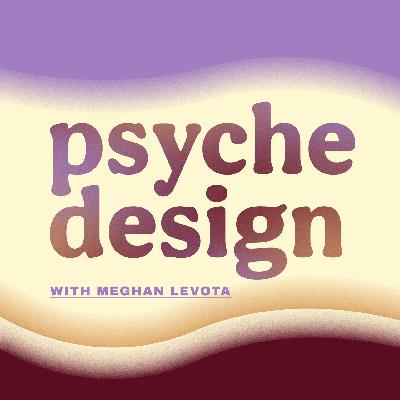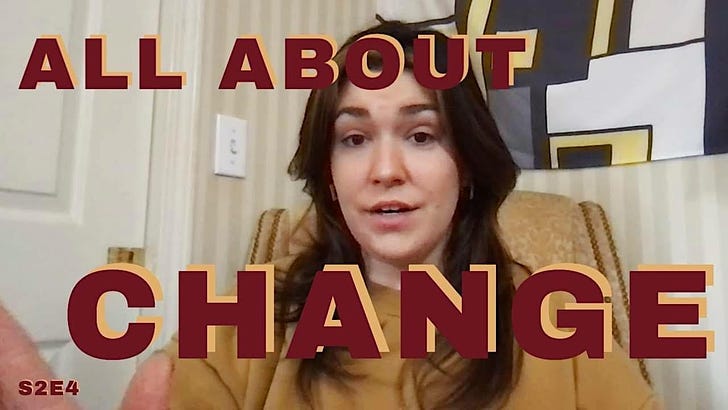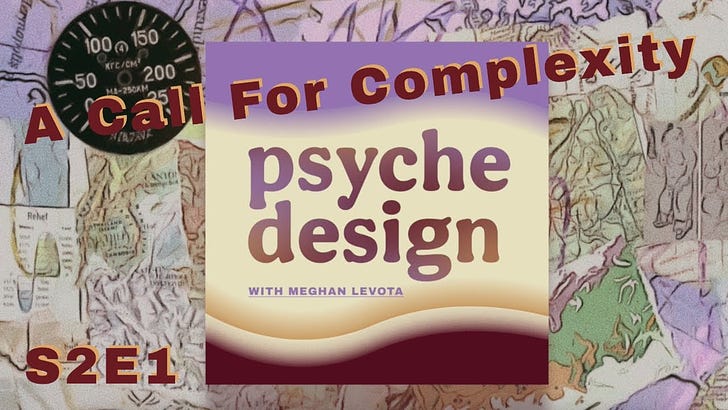A Friendly Face Toward The Shadow ~ S2E2 Psyche Design
Description
Interested in a workshop all about dancing with your shadow functions? Join me on October 8: https://www.meetup.com/baaptsf/events/288338568/
(I realize that this is last minute. I plan to offer similar workshops at a later date. Let me know if you’d be interested in attending something like this by leaving a comment).
Watch Psyche Design Season 2 Episode 2 on YouTube:
Transcript:
Hello there. So today I'm going to be discussing Turning a Friendly Face Toward the Shadow. And what kind of lifestyle would that be if you were someone that genuinely had, or generally had, a friendly attitude toward your shadow. So this is a huge topic. And I'm actually going to be doing a workshop on a very similar topic that's called Dancing with the Shadow: Embracing Your Inner Paradox next Saturday, the eighth, I believe. I'll have a link for that below, if you're interested. And if you can't make it, I understand that this is last minute I want to be doing, I will be hosting similar workshops in the future on this subject.
So a lot of you listening to this probably are familiar with Carl Jung's concept of the shadow. This episode is not going to be really focused on defining the shadow, I might make another episode on that, but I'm going to assume that you have a general understanding whenever I say the word shadow— which is essentially all the parts of our psyche that we're not conscious of, they might make our ego uncomfortable, we might be in denial of these things, it's a pretty general term for those contents of your psyche that you cannot see.
So, um, we also want to bring up the question of — Now that you know, your personality type (assuming that you do know your personality type), now, what? How does that knowledge of your personality type shift your perception?
So, I've been circling around these sorts of topics for several years now. But what I'm, what I'm coming to... like, this main point, I guess, that I feel like I'm coming to is this idea of — what is your ego's attitude toward the shadow? And I think that ,if you are familiar with your Jungian personality type pattern, that will tell you a lot about how your ego naturally functions, and your tendencies, your preferences, but it doesn't tell you what your attitude is toward the shadow.
Um, there's a lot of talk out there within the personality type community, like... let's say you're not really you don't have as much background on Jung, but you have been studying personality type for a while. There's a lot of different ways of talking about things such as ...developing your shadow functions, or tapping into your Inferior Function. All of the all of that regarding developing the shadow functions is a portion of "shadow work" in a more general way, because your personality is only going to be your... your personality type is just going to be sort of a sliver of your psyche.
It can kind of tell you this hero's journey that your ego might be going through. Now, one of my biggest criticisms of how people discuss personality type is, I think that the ego trap that we can get into is that once we, once we know what our personality type is, then what again, like I said, — Now, what what do we do with that information? The ego can approach this in different ways. The ego can double down on its own self-understanding and be like "yes, I am that, I am an ENFJ, I am a feeling type, I am an intuitive type, I am an extrovert." The ego could be like, yes, that is me. Now, what are the shadow sides of that?
So, using myself, my ENFJ best fit type as an example. The shadow of that would be introversion. It would be sensing, it would be thinking (more specifically with my cognitive functions, Extroverted Sensing and Introverted Thinking would be the exact shadow flip side of my Dominant and Auxiliary functions). Not to mention the shadow functions that you don't prefer. All of these are parts of the shadow.
And we can take the attitude of, "I'm a feeler. Therefore, none of that thinking stuff matters to me. None of that sensing stuff matters to me." Or you can take a different attitude, where you approach the shadow with curiosity with humility, with interest with openness.
So that is I guess my number one reflection question for all of you is what is your attitude toward the shadow?
And then, I'm going to be talking pretty generally about the attitude, and how to potentially develop an attitude toward the shadow that might be more embracing it. Because the thing is, is that...
It's normal for the ego to separate things between, "that's me, and that's not me." And that can be very helpful. And, in fact, even whenever you are discovering your personality type, it can be very helpful to be able to separate me from what's not me. If you realize you're an extrovert, it might help you figure out what kind of career to go into. Knowing that I have preference for intuition and feeling, for example, can help me figure out what what sort of careers to go into, it can help me understand maybe some of my relationship patterns, people I tend to gravitate toward.
Um, so, knowledge of type really is just the first step. And how you approach that knowledge of type is absolutely crucial for how much value type actually could bring your life. And I think that we don't talk enough about the *how* we talk a lot about the *what.* We talk about the difference between ENFJ and INFJ, we talk about the difference between intuition and sensing. And Ne and Ni, (if you're into the cognitive functions) we talk a lot about these differences.
And I think that if we don't talk enough about the *how* of how we are approaching that information... if we don't intentionally talk about the how, what will happen is that our ego will naturally without even thinking, do the separation game, where we double down on our identity. And we identify with these functions that are our preferences, or we identify with this personality type. So there's nothing wrong with seeing yourself in a personality type. However, each of the 16 personality types, they are assigned essentially, they're... they're kind of like social roles that you play. They're not the Self with a capital S.
Now, in Carl Jung's idea of individuation, it's all about this journey to find the Self. And the Self is separate from our egos. And so knowing your personality type can very well be a hindrance to finding your Self. Even though it tells you a lot about how your ego works. So that's why this attitude thing in this "how" is very important. Because if we're just taking in the information of "I'm an ENFJ, these are my tendencies, these are my shortcomings, and this is how I might manage stress, and these are the things that might trip me up." If I just take in that information without reflecting on that. And without thinking about, "what my attitude is going to be toward that?" It's so easy to just fall into a trap of "okay, well, I guess that means I need to avoid all of these things that are my weaknesses... or else I'm going to make a fool of myself, or else I'm going to fail, or else I'm going to experience pain."
It's the ego.. it's naturally you know, going to try and do that. So um, you know, knowing your personality type can be very beneficial for improving your relationships with friends and family who are a different personality type than you however, you also can choose to take in that information and discriminate against different types. You might say, "I don't know... that type is quite different from me. So I do not understand, I don't care to get to know those people."
Some... it's way too common in the type community for people to say things like, "I don't get along with this sort of type, or I would never date this sort of type." And, again, it's normal for ego to have preferences... like especially when it's coming to picking a job. For example, like, like I said before, the 16 personality types, they kind of play the social roles. You might think of it as a kinda a caricature, to be to be honest. It's not your Self. It's not who you really are deep down, it might even be similar to a mask you wear in order to perform a sort of social function.
You know, the ego is there for a reason. Your preferences are there for a reason, there's likely lots of potential and talent there. So for example, for me as an ENFJ, I'm going to attempt to use my extroverted feeling and introverted intuition to give back to society in some way, because those are the functions that I naturally use. And so you know, there's got to be an outlet for your your dominant functions, I'm not saying to like, not focus on them at all. But I think that there's this, there's this wall between what we're conscious of, and what we cannot see.
And I think that, so ... Jung suggested that having this attitude toward the shadow was a moral ... was actually an ethical thing. And he described it as a moral feat to be able to embrace the shadow. So "Shadow Work" is a whole other topic that I could do another video on, but I'm sure you've heard about it, it's become quite a buzzword these days. But the whole idea of doing Shadow Work is a lifelong journey. So what I'm talking about, though, today is the first step, I'm talking about the attitude that your ego has. And this is something that we can shift, shift to just a small thing, and it can make a huge difference. And I think that regarding the attitude we had toward the shadow, there's always going to be a wall between what we're conscious of and what we're not, however, um, how thick is that wall?
And so it can go the wall bet








